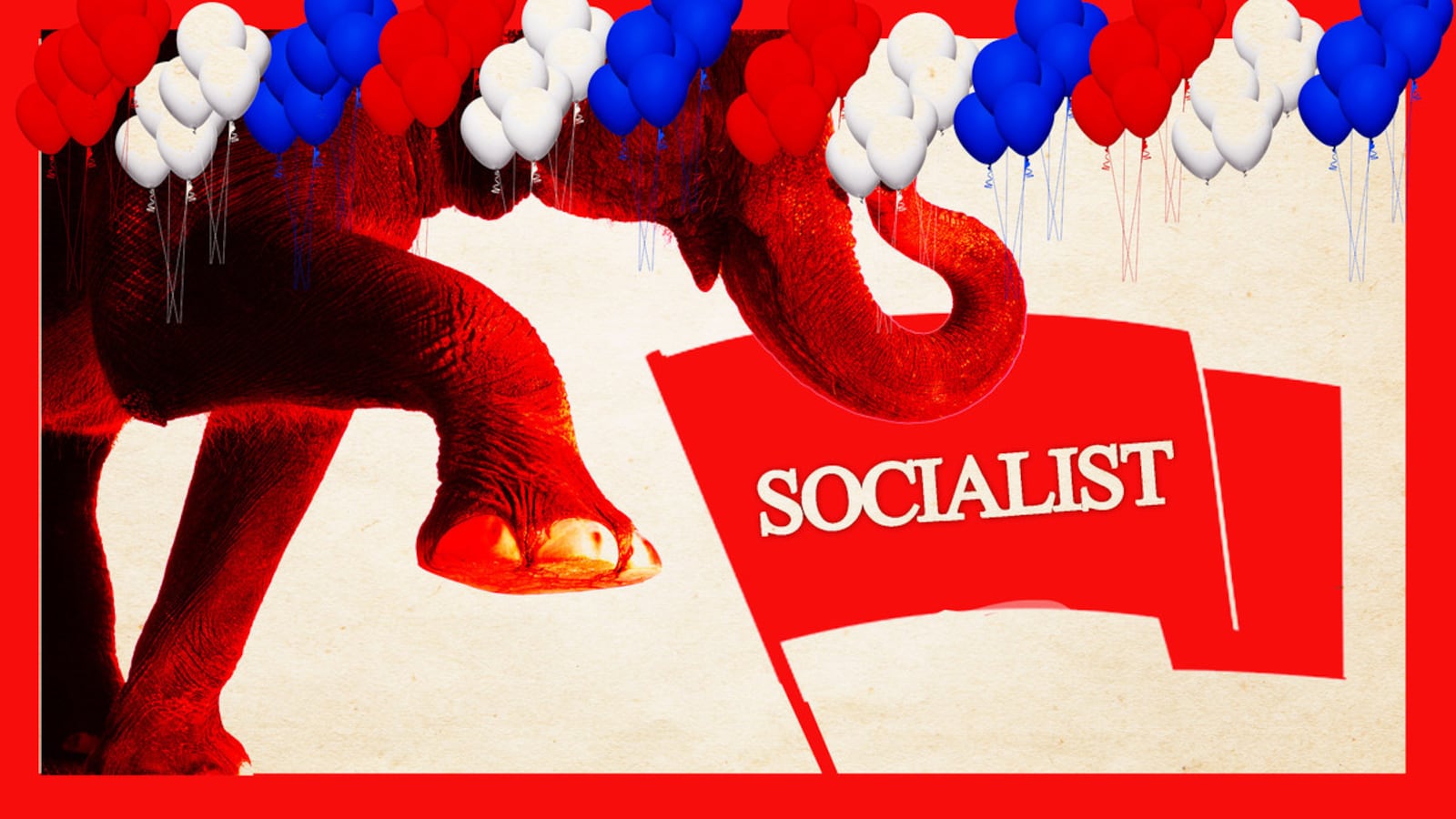Socialism—it’s a convention tradition for the GOP.
References to the economic philosophy of government ownership were only slightly outnumbered by the words “the” and “Trump” on the first night of the remote-access GOP summit on Monday. Ex-United Nations Ambassador Nikki Haley warned of the nefarious influence “the socialist left” would have on former Vice President Joseph Biden’s prospective administration, while Sen. Tim Scott (R-SC) imagined the Democratic nominee and his understudy Sen. Kamala Harris (D-CA) would look to implement a “socialist utopia.” The first son’s significant other, Kimberly Guilfoyle, inveighed against a “socialist Biden-Harris future,” while Florida businessman Maximo Alvarez warned that Democrats wanted Americans to “trust a socialist state more than your family.”
No doubt, socialism is at something of a high-water mark in recent history: Self-identified socialists currently hold four of 535 voting seats in the House of Representatives and Senate. But as the red tide has ebbed and flowed along the Potomac over the past 15 presidential election cycles, exhortations at the GOP convention about the Democrats’ purportedly far-left inclinations have rarely abated.
Then-California Gov. Ronald Reagan was an early Republican trend-setter. In his famous convention address, “A Time for Choosing,” the future commander in chief warned that then-President Lyndon B. Johnson was working to “impose socialism” and that Democrats for years had emulated “the Labour socialist party of England.”
Illinois Sen. Everett Dirksen repeated this critique of Johnson at the 1968 convention, calling his package of “Great Society” programs—which included Medicare and Medicaid—“the fancy of an English socialist.”
In 2016, Republicans were sounding similar red notes. “They had a choice between two socialists, and they chose the one under FBI investigation,” Sen. Tom Cotton (R-AR) declared at the 2016 Republican conclave in Cleveland, describing the primary defeat of Sen. Bernie Sanders (I-VT)—then the only socialist on Capitol Hill—at the hands of Hillary Clinton, the defiantly capitalistic ex-secretary of state.
Four years earlier, then-Rep. Michele Bachmann (R-MN) asserted at a pre-convention rally that President Barack Obama’s re-election would mean seeing “socialism implemented in our country.” A Republican businesswoman made a similar statement that week at a convention event hosted by former House Speaker Newt Gingrich.
Republicans were a little later to hurl the label in earnest in the 2008 campaign, only beginning to go full-bore in October. But former California Gov. Pete Wilson started a month early, asserting at a delegation breakfast during the September convention that “the audacity [Obama]’s offering us is socialism.”
It’s a common complaint. In fact, only one Democratic nominee since 1960 has escaped the Republican convention unscathed by any such insinuations: former Vice President Al Gore in 2000. (And the American Conservative Union would accuse him of holding a “far-left socialist vision” for the country that fall.)
The legendary late Arizona Sen. Barry Goldwater laid out quite a few socialist sobriquets, invoking the term at four conventions. In 1960, he warned that the Democratic Party, led by the hawkish then-Sen. John F. Kennedy, had laid out a “blueprint for socialism.” In 1972, he intoned gravely about the “socialistic promises” of the liberal South Dakota Sen. George McGovern. In 1976, he asserted that Jimmy Carter, the evangelical Christian governor of Georgia, would bring about a “suicidal slide toward socialism”—remarks he echoed at the podium of the 1980 convention in Detroit, when he alleged that vague forces in Washington were “trying to lead us into socialism.”
By 1984, Reagan was seeking re-election against Carter’s vice president, Walter Mondale. At the GOP convention that year, future Texas Sen. Phil Gramm asserted “the industrial policy of the Democrats is socialism wrapped in computer paper.” Four years after that, former Arizona Gov. Evan Mecham told a gathering of young conservatives at the convention in New Orleans that “the Dukakis socialist agenda will so unsettle investor confidence that it will wreak havoc on our economy in unprecedented proportions.”
After three consecutive defeats in the presidential contests of the 1980s, in 1992 the Democrats nominated then-Arkansas Gov. Bill Clinton as their standard-bearer. But commentator Pat Buchanan, who had run a surprisingly robust primary challenge against incumbent President George H.W. Bush, was unconvinced. The Democratic Party convention at Madison Square Garden the month prior was made up of “liberals and radicals... dressed up as moderates and centrists—in the greatest single exhibition of cross-dressing in American political history.”
This “Culture War” speech, which observers subsequently blamed in part for Bush’s defeat in the fall, further labeled Hillary Clinton an advocate of “radical feminism.” The GOP platform that year contained four references to socialism, despite the recent collapse of the Soviet Union.
“At a time when the rest of the world has rejected socialism, there are communities here at home where free markets have not been permitted to flourish,” one plank read.
The document’s tone grew darker in alluding to child emancipation, then a popular topic on daytime television.
“This is the ultimate agenda of contemporary socialism under all its masks: to liberate youth from traditional family values by replacing family functions with bureaucratic social services,” it states. “That is why today's liberal Democrats are hostile toward any institution government cannot control, like private child care or religious schools.”
Republicans continued to assign socialist sentiments to the Clintons at the 1996 convention.
“It’s time to wake up, America, to President Clinton and his high taxing, free-spending, promise- breaking, Social Security-taxing, health care-socializing, drug-coddling, power-grabbing, business-busting, lawsuit-loving, U.N.-following, FBI-abusing, IRS-increasing, $200 hair-cutting, gas-taxing, over-regulating, bureaucracy-trusting, class-baiting, privacy-violating, values-crushing, truth-dodging, Medicare-forsaking, property rights-taking, job-destroying friends. And that’s just in the White House,” declared then-Sen. Kay Bailey Hutchison of Texas.
Even in 2004, when Sanders was a little-known and politically isolated member of the House of Representatives and the fall of the Berlin Wall was an increasingly distant memory, then-Gov. Arnold Schwarzenegger of California linked the Democratic Party with socialism—recalling his own childhood in Austria, and the 1968 debates between Richard Nixon and Democratic nominee Hubert Humphrey, the former vice president.
“As a kid, I saw the socialist country that Austria became,” Schwarzenegger said. “I heard Humphrey saying things that sounded like socialism, which I had just left. But then I heard Nixon speak. Then I heard Nixon speak. He was talking about free enterprise, getting the government off your back, lowering the taxes, and strengthening the military.
“I said, ‘What party is he?’ My friend said, ‘He's a Republican.’ I said, ‘Then I am a Republican.’”
These statements surprised observers, not only because Humphrey had been dead 26 years and Nixon resigned the presidency in disgrace, but the Austria of Schwarzenegger’s youth was led by an unbroken string of conservative chancellors.
This long-running trend might have been what former South Bend Mayor Pete Buttigieg had in mind when he anticipated coming GOP attacks during the primary campaign.
“If we embrace a far-left agenda, they’re going to say we’re a bunch of crazy socialists,” he said at a Democratic debate in July 2019. “If we embrace a conservative agenda, you know what they’re going to do? They're going to say we’re a bunch of crazy socialists.”





